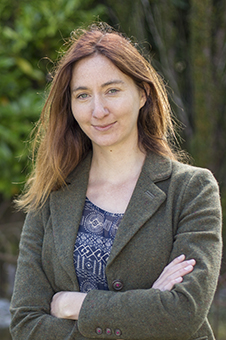
Dr Charlotte King has gained international recognition through her work in applying chemical and other scientific techniques to answer archaeological questions.
Photo: Graham Warman
Dr Charlotte King is a rising star in biological anthropology. This Otago graduate has gained international recognition through her work in applying chemical and other scientific techniques to answer archaeological questions. Her work is at the cutting-edge of archaeological science, allowing us to gather direct evidence for human behaviour from human remains. Now a Postdoctoral Research Fellow in the University's Department of Anatomy, Dr King's achievements and potential have been recognised with an Early Career Award for Distinction in Research.
“It's amazing to me that our body's tissues contain chemical records of our lives. In my research I get to reveal those stories and help the people of the present connect with the people of the past”, says Dr King.
After completing her PhD in 2013 from Durham University in the UK, Dr King received a New Zealand Rutherford Foundation Postdoctoral Fellowship to look at the effects of agriculture and climate change in prehistoric Chile. From that fellowship she published five first-authored papers in international peer-reviewed journals and contributed to two invited chapters to edited volumes. She was then employed as a Postdoctoral Fellow under a Marsden project, continuing her work in Chile.
This postdoctoral research centred on the agricultural transition in Northern Chile, and the use of incremental isotopic sampling techniques to identify changes to fertility, and subsistence strategy in variable climatic conditions. Here, she has used newly developed techniques to look at individual life-histories, and reconstruct events experienced by some of the earliest inhabitants of the driest desert in the world.
In 2018, Dr King was awarded a Marsden Fast-Start Grant to begin research into colonial experiences in New Zealand – continuing to use chemical techniques to reconstruct the lives of Aotearoa/New Zealand's colonial settlers in unprecedented detail. You can read about this research in her successful public blog, Southern Cemeteries Archaeology Project.
Southern Cemeteries Archaeology Project
“Dr Charlotte King has already established a stellar research career which has flourished since she returned to her alma mater, the University of Otago. Not only is she an outstanding researcher, but she is a dedicated and extremely talented teacher and scientist,” says Professor Lisa Matisoo-Smith, Head of the Department of Anatomy.
Dr King has an excellent publication record with 21 papers published in top ranking journals. She is also a peer reviewer for 10 international journals. She was invited to join the World Archaeology Congress' Scientific Advisory Committee in 2019, as part of the bioarchaeology and archaeological science team. She has twice received honourable mentions from the Institute of South East Asian Archaeology Early Career Awards for her work looking at subsistence change in Southeast Asia. She reviews funding applications for Fondo Nacional de Desarrollo Científico y Tecnológico, Chile and the Research Foundation – Flanders.
She is making a significant contribution to the next generation of scientists. She is an outstanding lecturer, supervisor and mentor – receiving the OUSA Division of Health Sciences Supervisor Award and the Otago University New Supervisor Award. She has also designed and implemented outreach activities to reach younger scientists.
A gifted science communicator, Dr King co-ordinates significant public science communication projects. She created the Biological Anthropology “snack” as a part of Hands-On at Otago that has run since 2017, and co-designed and taught for the Biological Anthropology part of a Science Wānanga at Otakou Marae in 2018. She has given invited public talks at Toitu Otago Settlers' Museum and the Hocken Library presenting her research into colonial New Zealand.
